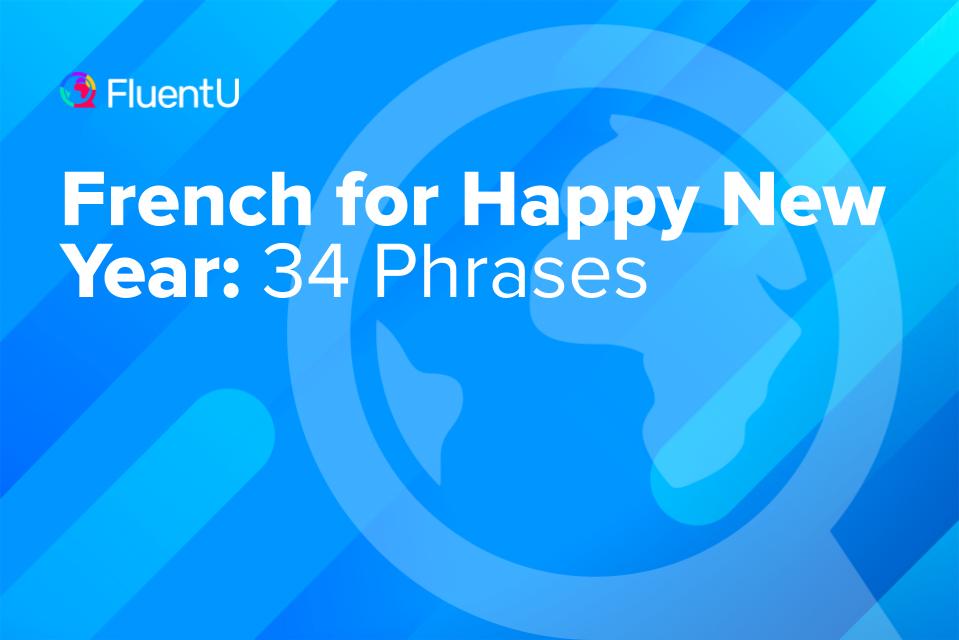Contents
- French for “Happy New Year” and Other Common Phrases
- Bonne année ! — Happy New Year
- Le réveillon de la Saint-Sylvestre — New Year’s Eve
- Le jour de l’an — New Year’s Day
- Minuit — Midnight
- Le 31 décembre — December 31st
- Le premier janvier — January 1st
- Compter — To count
- La fin d’année — The end of the year
- Meilleurs vœux — Best wishes
- Joyeuses fêtes ! — Happy Holidays!
- Words for Your French New Year’s Celebrations
- New Year’s Resolutions in French
- Perdre du poids — To lose weight
- Manger plus sainement — To eat healthier
- Faire plus d’exercice — To exercise more
- Obtenir une promotion — To get a promotion
- Changer de travail — To change jobs
- Économiser de l’argent — To save money
- Passer plus de temps en famille — To spend more time with family
- Se faire de nouveaux amis / Se faire de nouvelles amies — To make new friends
- Apprendre une nouvelle compétence — To learn a new skill
- Être plus social / sociale — To be more outgoing
- Prendre un nouveau passe-temps — To take up a new hobby
- Where to Get a Taste of the French New Year
- And One More Thing...
French for Happy New Year: 34 Phrases

It’s not hard to see why the New Year is one of the most widely celebrated holidays around the world. For some added fun and flair, why not learn a bit of French too for your New Year’s celebrations?
We’ll show you essential phrases in French for “Happy New Year” and other typical holiday wishes, along with vocabulary to celebrate like the French do and even set your New Year’s resolutions in French.
Download: This blog post is available as a convenient and portable PDF that you can take anywhere. Click here to get a copy. (Download)
French for “Happy New Year” and Other Common Phrases
Bonne année ! — Happy New Year
Le réveillon de la Saint-Sylvestre — New Year’s Eve
Le réveillon de la Saint-Sylvestre literally translates to “The Eve of Saint Sylvester” and refers to the feast day for this Catholic saint and former Pope. Sometimes, the phrase is shortened simply to la Saint-Sylvestre (Saint Sylvester). The French refer to the feast day when talking about New Year’s Eve.
There’s another non-religious term for New Year’s Eve as well, which is le réveillon (evening party/feast) or le réveillon du premier de l’an (the evening party/feast for the first of the year). These phrases can be used to refer to either New Year’s Eve night or even New Year’s Eve dinner.
Here are two example sentences:
Il y a un réveillon chez moi pour la nouvelle année.
There is an evening dinner party/feast at my house for the New Year.
On va passer le réveillon du premier de l’an ensemble.
We’re going to spend New Year’s Eve together.
Le jour de l’an — New Year’s Day
You can also say le Nouvel An (the New Year).
Minuit — Midnight
Le 31 décembre — December 31st
Let me take this opportunity to remind you that months are not capitalized in French!
Le premier janvier — January 1st
Compter — To count
While le compte à rebours is French for “countdown,” or “counting backward,” it’s more common to simply say something along the lines of on compte les secondes avant la nouvelle année (we count the seconds before the New Year).
La fin d’année — The end of the year
Meilleurs vœux — Best wishes
You could also add to this statement by saying meilleurs vœux pour la nouvelle année (best wishes for the New Year).
Joyeuses fêtes ! — Happy Holidays!
While joyeuses fêtes can be used for any holiday, you can also say bonnes fêtes de fin d’année which literally translates to “Happy end-of-the-year holidays.”
As a side note, all of the above four phrases—meilleurs vœux, meilleurs vœux pour la nouvelle année, joyeuses fêtes and bonnes fêtes de fin d’année—could be used on holiday cards in place of the popular English phrase “Season’s Greetings.”
Words for Your French New Year’s Celebrations
La fête — Party
Célébrer / Fêter — To celebrate
While célébrer literally means “to celebrate,” it’s pretty much interchangeable with fêter, which would more literally mean, “to party.”
Danser — To dance
Les confettis — Confetti
Le karaoké — Karaoke
La musique — Music
Les amis / amies — Friends
Don’t forget to add the “e” if you need to make the word feminine to talk about an all-female group of friends.
Les feux d’artifice — Fireworks
The literal translation is “artificial fire.” French sure is poetic, isn’t it!
Le gui — Mistletoe
You may associate mistletoe more with Christmas than any other holiday, but in France, it’s quite common to kiss under the mistletoe during New Year’s festivities as well.
S’embrasser — To kiss
This is just one of the many ways you can talk about kissing in French. You can also say faire une bise à or donner un bisou à which both mean “to give a kiss to someone.”
I recommend one of these other sayings if you want to imply a simple peck or friendly kiss. Otherwise, reserve s’embrasser for when you share a more passionate kiss with your significant other.
Le champagne — Champagne
Un toast — To toast
Un toast is an anglicism, meaning the French adopted the noun from English.
However, in order to talk about the act of toasting someone, you need to use either porter un toast (to propose a toast) or lever son verre à (to raise your glass to someone).
Boire — To drink
New Year’s Resolutions in French
Perdre du poids — To lose weight
Manger plus sainement — To eat healthier
As a side note, la santé means “health,” and the phrase en bonne santé means “healthy,” or more literally “in good health.”
Faire plus d’exercice — To exercise more
Remember that there’s no verb in French that means “to exercise.” Rather, you need to use the whole phrase above, which literally translates to “to do more exercise.”
You can also use the phrase faire du sport (to do sport). Note that the word faire (to do/to make) is used rather than the verb jouer (to play) when talking about sports in French.
Obtenir une promotion — To get a promotion
Changer de travail — To change jobs
Économiser de l’argent — To save money
There’s another way to talk about money in French, which can be especially useful when discussing saving for something specific. The phrase is mettre de côté (to put aside).
For example, you could say, Je mets de côté une somme suffisante pour acheter un nouvel appartement. (I’m putting aside a sufficient sum in order to buy a new apartment.)
The English translation may sound a bit formal to your ear at first, but it’s perfectly standard to use this construction in French.
Passer plus de temps en famille — To spend more time with family
Notice the use of the preposition en (in) in this phrase. It’s not the same as its English equivalent, which uses the preposition “with” ( avec in French).
Se faire de nouveaux amis / Se faire de nouvelles amies — To make new friends
Apprendre une nouvelle compétence — To learn a new skill
Être plus social / sociale — To be more outgoing
Prendre un nouveau passe-temps — To take up a new hobby
While this is probably the most commonly used phrase in French, some people do replace passe-temps (pastime) with the English word “hobby.” In other words, the anglicism is also used.
Here’s an example:
J’ai besoin de trouver un autre hobby. (I need to find another hobby.)
Where to Get a Taste of the French New Year
If you’re looking for a fun way to incorporate French into your New Year’s celebrations, there are many ways to do so from the comfort of your own home.
For starters, you can improve your reading skills with some New Year’s themed poems. Believe it or not, there are tons of them online, and my personal favorite sites on which to find them are Dico-Citations and Mon Poème (My Poem).
Or, if you’re more of an auditory learner, try listening to Lokassa Ya M’bongo’s famous New Year song called “Bonne année” (“Happy New Year”).
For those of you who love comedy and enjoy watching videos on YouTube, check out this hilarious video from online comedian Hassan.
He parodies what the New Year is really like and talks about expectations versus reality. A word of warning that there’s the occasional French swear word, but really you can’t beat learning French New Year’s vocabulary through funny videos!
You can now turn any YouTube video into a language lesson with the help of FluentU.
FluentU takes authentic videos—like music videos, movie trailers, news and inspiring talks—and turns them into personalized language learning lessons.
You can try FluentU for free for 2 weeks. Check out the website or download the iOS app or Android app.
P.S. Click here to take advantage of our current sale! (Expires at the end of this month.)
You’re officially ready to celebrate the New Year in true French fashion. Meilleurs voeux pour la nouvelle année!
Download: This blog post is available as a convenient and portable PDF that you can take anywhere. Click here to get a copy. (Download)
And One More Thing...
If you like learning French at your own pace and from the comfort of your device, I have to tell you about FluentU.
FluentU makes it easier (and way more fun) to learn French by making real content like movies and series accessible to learners. You can check out FluentU's curated video library, or bring our learning tools directly to Netflix or YouTube with the FluentU Chrome extension.
One of the features I find most helpful is the interactive captions—you can tap on any word to see its meaning, an image, pronunciation, and other examples from different contexts. It’s a great way to pick up French vocab without having to pause and look things up separately.
FluentU also helps reinforce what you’ve learned with personalized quizzes. You can swipe through extra examples and complete engaging exercises that adapt to your progress. You'll get extra practice with the words you find more challenging and even be reminded you when it’s time to review!
You can use FluentU on your computer, tablet, or phone with our app for Apple or Android devices. Click here to take advantage of our current sale! (Expires at the end of this month.)











